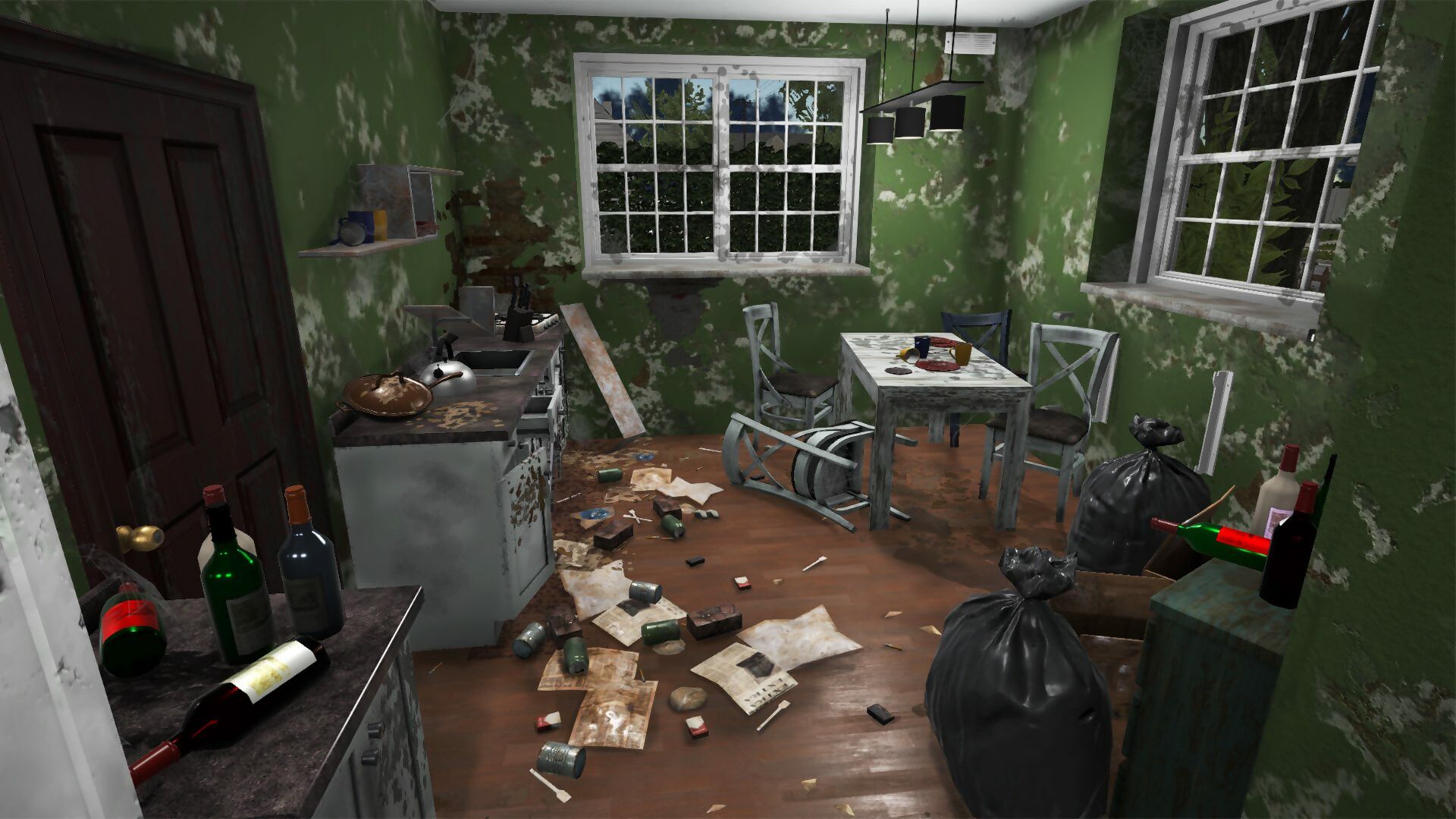
PowerWash Simulator. House Flipper. Arcade Paradise. We speak to the job simulator developers that have perfected the art of letting players be their own boss.
Washing cars. Building wardrobes. Cleaning up rubbish. It turns out all the jobs we used to do to earn pocket money as kids are now big business in video games, especially when they’ve been gamified to the extent that it’s sometimes hard to stop doing them. Yes, after what feels like years of being held back by niche budget restraints, this year has seen the job simulator genre explode into the mainstream.
Because while doing chores in real life can be a grind, in the digital realm, factors like effort, exhaustion, and (most importantly) mundanity seldom apply. Video games are instead able to imbue everyday tasks with an almost therapeutic quality, and it’s this feeling that the best job simulators have managed to perfect.
One of 2022’s biggest breakout successes arguably proved this point: PowerWash Simulator from FuturLab. In it, players are presented with a generous list of dirty scenarios which they must blast, spray, and mist their way through using – you guessed it – a power washer. Cleaning up the mud-laden surfaces of, say, a park, van, or garden patio is satisfying enough in its own right, but combined with the feeling of power flowing through your hands, simulated by your controller’s rumble motor? The development team knew they couldn’t go far wrong.

“Power-washing has an inherently mesmerising and satisfying charm to it,” says the game’s lead designer, Dan Chequer. “The act of cleaning is very visual and direct, so the clear feedback loop is effortless to communicate both to new players and to others who may be interested in the game. The experience is defined by the process rather than the subject matter or the player’s role, allowing for a lot of variety in the jobs, because with power-washing, we can clean anything we choose.”
Under pressure
After putting together a basic prototype and releasing a demo on itch.io in early 2020, FuturLab quickly garnered some great feedback from those who played it. This gave the studio the confidence it needed to expand its quirky concept into a full release. As gratifying as endlessly cleaning surfaces could be, however, it was important for the team to accurately mimic the sensation of using a power washer. After all, cleaning your mum or dad’s car with a sponge and bucket isn’t a particularly exciting task, but conversely, the same job is made instantly more enjoyable if you’re using a power washer.
“The main challenge was to retain an authentic power-washing experience, yet exaggerate it enough to be able to tackle the wide range of vehicles and large locations we had planned,” says Chequer. “We made the cleaning equipment authentic, but removed any elements of the experience that you wouldn’t particularly enjoy in real life.”
PowerWash Simulator thankfully does away with the tool’s usual cord restrictions, for example. “This approach also had the advantage of being easier to implement,” Chequer adds.

Reality’s rules were also diverged from in other ways, all to help make the process of power-washing more fun. “The things that you get to clean became the focus for where the variety was going to be, so we made sure that the jobs went beyond what you would realistically expect to power-wash in real life.” A quick trip in space to clean the Mars Rover, anyone?
To the moon
Also setting its sights on the stars, playing fast and loose with what the “simulation” half of a job simulation game can actually mean, is Hardspace: Shipbreaker. It differs from most genre entries in that, by nature of it being set in a fictional, spacefaring future, it’s able to invent its own rules. We can all imagine what it’d be like to drive a bus or a train for a living, but nobody really knows what it’d be like to work as a blue-collar spaceship salvager slicing up vessels for scrap. A purely fictional ‘job’ can still prove equally as fulfilling, though, when treated with appropriate depth and believability.
“We wanted to challenge ourselves to make a game about skilled labour in the future,” says game director Elliot Hudson of Hardspace: Shipbreaker’s humble origins. “Really, there’s nothing mundane about floating in zero gravity with powerful and destructive tools that you’re about to use to tear ships apart in the most efficient way possible. For us, that sounded just as exciting as racing a car or shooting a gun. The challenge is to figure out a combination of interactions, sound, visuals, and physics that make each step of the process fun the first time you’re doing it, as well as the hundredth time you’re doing it.”
As is evident, then, just because Blackbird Interactive’s game has the appeal of being set in space, the distinct lack of rules that comes with that (in terms of the job being simulated) isn’t without its own obstacles. Some people might even call into question whether the likes of Hardspace: Shipbreaker could be called a job simulator game at all, even though it meets the genre’s typical criteria of requiring players to be painfully methodical in their approach. For example, just one slip of your plasma cutter could cost you an inordinate amount of income, which, in-universe, you must earn in order to pay your billion-credit debt back to the faceless LYNX corp. Just like PowerWash Simulator, the biggest reward comes from a job well done.

“We put a lot of effort into making it satisfying and enjoyable to make a cut through the hull of a ship every single time,” Hudson explains. “But on top of that, there’s the joy that comes from learning the intricacies of each different ship type, the way a mechanic might master the nuances of certain car models over time.”
This parallel with racing games is one that Hudson and his team regularly returned to, not just in the hope of achieving some semblance of groundedness but also as a reminder that it’s OK to take risks within a genre’s typical boundaries.
“It’s hard to make any task engaging and fun for players,” says Hudson. “There are so many racing games out there, for instance, that you’d think creating a racing game is a solved problem, but it still takes so much care, time, and creativity to make it all sing.”
Home truths
If PowerWash Simulator makes the real-life act of cleaning even more satisfying, and Hardspace: Shipbreaker’s hook for players lies in its depiction of a career future generations might pursue, surely it’d be impossible to make house development – often a source of stress for many – equally as fun and therapeutic? 2018’s House Flipper more than proved the contrary, though. It’s a job simulator that casts you as a one-person renovation crew, buying houses, giving them a much-needed bit of refurbishment, and then “flipping” them for a tidy profit.

Earning the most income possible is another mainstay of the job sim genre, even if it’s treated more as a means to an end rather than what the entire experience should be about.
“Honestly, it wasn’t important for us at all,” says Empyrean’s Patryk “Roumyan” Przybyła, on including profit as a core driver in House Flipper. “It just felt natural, as people like to have some kind of goals to achieve, but this game is definitely all about the process itself. Most of our players would be happy with a house-renovating sandbox, where they can paint walls for hours, but there are some people trying to accumulate as much cash as possible, so this mechanic definitely made it easier for us to expand our community. But yeah – simulation games usually have some kind of profit-based mechanic implemented, and it seems to be one of the rules in this genre.”
Empyrean found itself in the fortunate situation of not having to wrestle with the same level of monotony other job sim developers face, simply because House Flipper rarely has you repeatedly perform the same act. Flipping a house means knocking through walls, sweeping the floors, shining up surfaces, and rewiring electrical circuits. The game’s scope is more ambitious compared to titles that choose to focus on one specific action or niche, but the result is a slightly more varied suite of tasks.

Even post-release, the studio didn’t shy away from offering avid flippers more ways to indulge in the art of renovation, as evidenced by several expansion packs relating to gardens, farms, and pets. “We felt so attached to the game that we didn’t want to abandon it,” Przybyła says. “The most difficult thing is to find a balance between engaging and real content. Most of our players enjoy cleaning the most. So what makes flippers so keen on swiping the mop left to right? It’s all about constant feedback – they can see how the space changes with every move they make, and it’s definitely satisfying, but it’s not real – we had to exaggerate this part a little.”
Out to dry
The acts of cleaning and change are also a constant in the more exuberant Arcade Paradise. Set in a launderette where you must balance your daily tasks between handling people’s laundry and running a pop-up arcade in the back, the game differs from other popular job sims in that it offers an endless push-and-pull- style tussle for your attention – it never lets you focus on a single discipline. In fact, developer Nosebleed Interactive has been quite clear on its hope for players to eventually reach a point where they make more money from the arcade’s popularity, relying less on having to dry clothes, scrape chewing gum, and pick up rubbish. So focused was the studio on having the arcade side as the main focus that Arcade Paradise wasn’t initially set in a laundrette at all.
“Originally, it was going to be a video shop, like a Blockbuster,” reveals Nosebleed managing director, Andreas Firnigl. “For a teenager in the 1990s, working in a video shop was quite glamorous – it was an aspirational job.
“Some of the ideas were that we’d have loads of fake video tapes, [and] you’d have to rewind them for people. What I originally wanted as well was to get a bunch of out-of-copyright movies, like old black-and-white [films], and you could watch them and give the player a trophy or an achievement for watching.
“But that would have been a stupid amount of work, from an art perspective, doing hundreds of different video cases… ”

Launderettes are significantly less aspirational, by comparison, but then even Arcade Paradise manages to make the mundane tasks more enjoyable than they otherwise would be in real life, by coating your actions in zippy, pixelated VFX indicative of the early nineties arcade era, speeding up the daily routine, and letting you watch the profits roll in. Sound familiar?
In truth, the true job sim aspect comes from watching your business build and grow over time, as opposed to how many strangers’ undies you can clean in any given 24-hour period. This idea of gradual change, where the state of an environment or item evolves as a result of your actions, is where the true gratification from the job simulation genre truly lies.
Keep it cool
In addition to how well they represent and replicate otherwise mundane tasks, as alluded to earlier, the job sims that appeal most to a broad audience are those that put players in a relaxed state. Sticking to a routine and following procedure is an essential part of any job, true, but still, there’s an absence of stress in these games that – more often than not – isn’t necessarily found in their real-world counterparts. This comforting aspect is one that a lot of modern studios working in the genre now actively chase, reinforcing it in as many of their game’s mechanics as possible.

“While we were still in the early stages of the development, we were just winging it,” says Patryk Przybyła. “We knew that House Flipper is supposed to be stress-free, but when we realised how relaxing it is, we decided to just take this characteristic to the next level.
“Lots of my friends struggle with keeping their mental health in a good condition, especially [since] the Covid pandemic all around the world, so getting comments saying that our game is helping people with their depression and anxiety really warms my heart.”
Even if letting players relax within the confines of what is conventionally an arduous job sometimes means offering a separate mode, it’s worth it, and this was exactly the case for Hardspace Shipbreaker.
“It took so much iteration and hard work,” explains Elliot Hudson. “But finding mechanics that in one game mode can feel exciting as you try to finish a job before you run out of air, and in another game mode can be used as a way to relax and slow down in real life? It’s a combination that doesn’t happen very often, and it can feel a little like catching lightning in a bottle. Once we realised how well it worked for both goals, we really leaned into it and tried to serve both audiences as well as possible.”

Ultimately, whether designed around evoking a specific feeling within the player or not, job simulators – of all varieties – represent a genre arguably most suited to comfort food gaming. Taking a known, relatable practice and engaging in it entirely at your own pace helps to reduce life’s complexities down to a single task, that in a job simulator you have total control over.
“Taking inspiration from real-world activities has a few advantages – one of the big ones being the relatability in the mind of potential players,” says Dan Chequer, summing up. “The name PowerWash Simulator immediately evokes ideas of what the game might involve, and it allows potential players to make a snap decision as to whether they would be interested [in the game] or not.
“[Such games] also tend to have a novelty or uniqueness about the experience that they are promising, which is attractive both for players who are familiar with the more traditional game genres, and for players with less game experience who find such concepts easier to relate to than more abstract game designs.”





